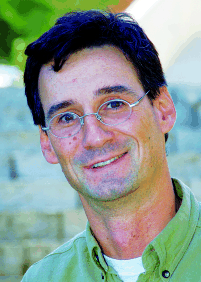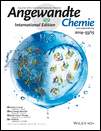Chemistry in Israel—at a Crossroads?†
The author wishes to thank Yitzhak Apeloig, Ehud Keinan, Erick M. Carreira, Amir H. Hoveyda, and Amitai Halevi for interesting discussions and careful editing.
Israel, a small country of approximately eight million inhabitants and with no more than seven chemistry departments, is home to four recent Nobel Laureates in Chemistry (Aaron Ciechanover and Avram Hershko, 2004; Ada E. Yonath, 2009; Dan Shechtman, 2011). What might be at the heart of this astonishing success?

Such achievements are the fruits of the inspired and incisive leadership that served as the foundation of the academic world in my country—the manifestations of an early vision that has led to what we have come to know as modern Israel. David Ben-Gurion, undoubtedly one indefatigable agent of progress, as well as the country’s inaugural Prime Minister, wrote two years after the creation of the State: “We are a small and poor nation, and our country has suffered neglect and devastation. This imposes a severe austerity upon us, a condition, which may last a long time. Strangely enough, these very facts forbid us austerity in two areas, in science and technology …︁ Only if we were able to use the attainments of scientific and technological developments—can we succeed”.
Chaim Weizmann (1874–1952) was a visionary leader who forged a permanent mark on the state of Israel and the trajectory of its scientific development. From a persecuted Jewish community in tsarist Russia, through the chemical laboratories of University of Manchester to the Presidency of the fledgling State of Israel, Weizmann emerged as a paladin of Israeli chemical sciences. In this way, Weizmann’s own research activities came to support the principle that the establishment of a thriving Jewish homeland must have the continuous support of thriving scientific culture. Weizmann’s relentless yearning for the expansion of knowledge found its expression in the establishment of institutions for research and higher learning: universities, technical schools, research institutes, and agriculture stations, as well as an assortment of industrial ventures. In 1918, together with Lord Balfour, he laid the foundation for the establishment of the Hebrew University of Jerusalem on Mont Scopus, a dream that was made reality in 1925. “We must create a high culture, based on Jewish morality, and make it a center of human culture,” is how Weizmann would describe the fire behind his ambition. Shortly prior to the birth of the Hebrew University of Jerusalem, 36 years before Israel’s declaration of independence, the plans for the founding of the Technion (Israel Institute of Technology) were conceived in April 1912; the first 17 students would enroll in the brand new Institute in 1924. For more than two decades prior to the foundation of the State of Israel, the Hebrew University of Jerusalem and Technion nurtured the much-needed technological and scientific growth of their country. In 1934, Weizmann went on to establish the Daniel Sieff Research Institute in Rehovot and served as its President. In 1949, on the occasion of Weizmann’s 75th birthday, and with the blessing of the Sieff family, the Sieff Institute was renamed the Weizmann Institute of Science. As one of the architects and founding fathers of the State of Israel, Weizmann was invited to become its first President in 1949, a position that he served until his death in 1952.
Ernst David Bergmann (1903–1975) was another singular visionary who contributed to the creation of Israel’s scientific excellence, particularly in the field of chemical sciences. Bergmann received his doctoral degree in 1925—at the age of 21—under the supervision of Wilhelm Schlenk at the Friedrich-Wilhelms-Universität in Berlin. In addition to the development of a thriving research enterprise, Bergmann authored, in collaboration with Schlenk, the two-volume Ausführliches Lehrbuch der organischen Chemie (Comprehensive Textbook of Organic Chemistry). The first instalment of the Schlenk–Bergmann initiative appeared in 1932. The second, published in 1939, however, was credited to only a single author, as the name of Jewish Bergmann was struck from the title page. The so-called “Civil Service Restoration Act,” passed in 1933 by the Nazi regime, banned government employment, including positions at state universities and research institutes, for every person of Jewish descent. Bergmann was forced to leave his post, allowing Weizmann to offer him a position at the newly established Sieff Institute. Bergmann will be forever firmly linked with the development of the science of chemistry in Israel. He played a key role in training an entire generation of chemists, and was instrumental in establishing virtually every notable Israeli institution devoted to the pursuit and application of physical sciences. In August 1948, Ben-Gurion appointed Bergmann, who later became known as the father of the Israeli nuclear program, as the head of the scientific department of the Israel defense forces. A few years later, Bergmann became the Prime Minister’s scientific advisor at the Ministry of Defense.
Within 25 years after the birth of the State of Israel, and with the creation of Tel Aviv University in 1953, Bar-Ilan University in 1955, and Ben-Gurion University in the late 1960s, there were nearly as many senior faculty members per capita as in the United States. The leaders of our young country considered higher education as a vital component of its infrastructure. The impressive investment by the country’s founding members led to the remarkable outcomes that we admire today, to what is often referred to as “The Start-up Nation” with its impressive numbers of recent chemistry Nobel laureates, and with the second-highest number of European Research Council (ERC) grants per capita, among all European Union and Associate members.
Nevertheless, despite this history and notable recent accomplishments, the esteem for the science of chemistry has diminished to an alarming degree in the eyes of the Israeli public; this change is perhaps most vividly manifested by chemistry being no longer a major component of the curriculum at the secondary school level of education.
In addition to the value of chemistry as a central science, the availability of a workforce that has proper knowledge of chemical principles is crucial to the success of the Israeli economy. The country’s chemical industry employs more than 28 000 people and accounts for nearly 20 % of Israel’s GDP and 15 % of the industrial exports. The contention that chemistry, a key component of Israel’s economy, must be nurtured at all levels was recently underscored with the discovery of sizable natural gas reserves. Estimated to hold a minimum 0.75×1012 m3 of gas in the Leviathan and Tamar fields, the full benefits of this resource, located approximately 130 km west of Haifa in the Mediterranean Sea, will only become a reality through applications of the latest advances in chemistry and its subdisciplines.
Present-day advances in the basic sciences, the sustenance for future progress in technology and engineering, are the fruits of yesterday’s dedicated capital; it is what we invest today that will determine the quality of tomorrow’s higher education and the pace of technological progress. The alarming alterations in science curriculum in Israel’s high schools contradict that above true-and-tested fundamental principle. Such policy shifts in education have led to decreasing numbers of young Israelis considering sciences as an attractive career option. Not long ago, a significant number of our most dedicated high school students were keen on studying physical sciences; such is no longer the case. To address this issue, the Schulich Faculty of Chemistry at the Technion has launched educational programs devised to enhance the quality of education in chemistry and to attract the next generation of chemistry teacher/scholars. Among the educational activities promoted for example is the Archimedes Program, through which, in order to keep alive the flame of their enthusiasm in the study of chemistry, the more advanced high school students are encouraged to enroll in university-level courses. During the last few decades, the Israeli Government’s national priorities have included its universities to a continually diminishing degree. There are other disturbing factors and indicators. A significant number of Israeli scientists carrying out postdoctoral research in the United States have been successfully recruited by American universities. In 2008 (the most recent available data), the number of Israeli nationals employed as academics in the United States constituted nearly 30 % of the entire senior staff employed by Israeli academic institutions; this represents more than five times the ratio for any of the other developed countries. The number of Israeli chemists in the 40 leading chemistry departments in the US accounts for one-eighth of the total number of chemistry faculty members in Israel. Such trends and developments suggest that, to improve its position as a world-class center for scientific research, Israel should consider a “more-open-door policy” towards a larger number of talented scientists who may wish to call an Israeli institution their home.
The past has shown us that great discoveries are often attained as a result of purely curiosity-driven scientific inquiry. Nevertheless, a growing part of Israeli funds are channeled solely into specific areas deemed to be of “greater national importance”. Although such initiatives are often necessary, it would be unwise to nurture them at the cost of continuing the progress much-needed in the basic understanding of our natural world.
As Israeli educators and scientists, is there cause for us to be concerned about our future? A common trait of our national character might be best represented by the phrase: “Don’t worry, all will be fine”. And, indeed, despite the worrying signals, the quality of chemical sciences in Israel remains high, partly because we have learned to navigate through constantly shifting waves of troubled waters; we know that, with optimism, solutions can be found even to the most daunting of problems. It is nonetheless crucial that we remain mindful of the successful approaches adopted by visionaries such as Ben-Gurion, Weizmann, and Bergmann; it is imperative that we espouse policies that are based on excellence in fundamental research in spite of our restricted working space and limited budget. The superior quality of the recruited new faculty members, indeed nearly 130 ERC Starting and Proof-of-Concept Grants were funded in Israel since the beginning of the program, is among the factors that are cause for optimism. Maybe one bright day, the Middle East will follow Europe’s example, and become fully united. Perhaps then, the young and persistent state of Israel, by participating in the development of a modern Middle East, will be given the opportunity to play a role in promoting and advancing the field of scientific research that benefit of all mankind.
Ilan Marek
Technion–Israel Institute of Technology




